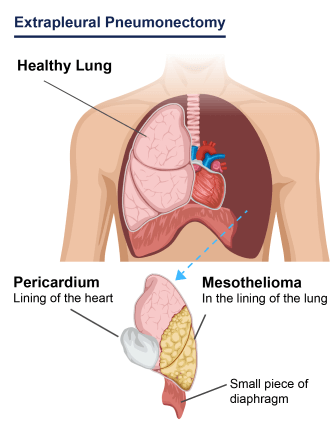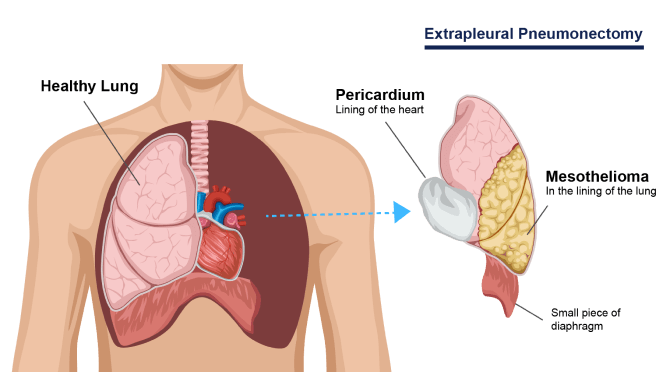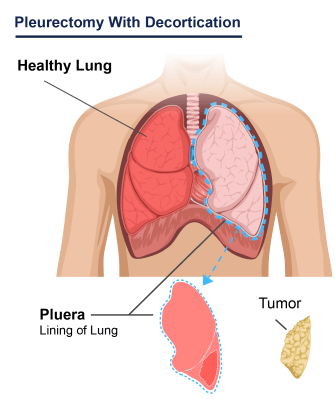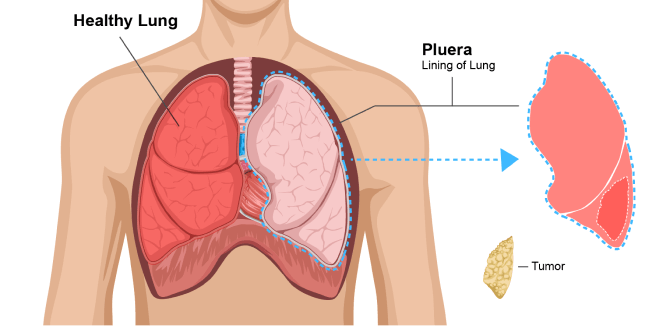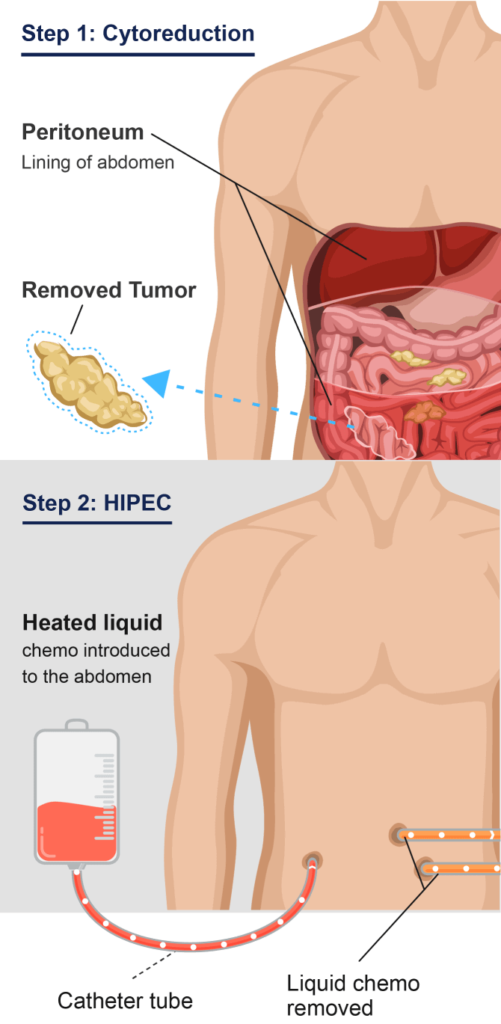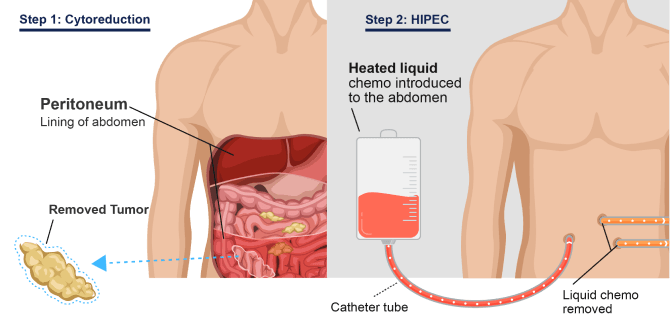If your mesothelioma goes into remission, that means doctors can no longer find any evidence of the cancer in your body. Some patients have lived for years in remission. It's possible to achieve mesothelioma remission with medical treatment, including chemotherapy, radiation therapy, and surgery.
Can Mesothelioma Go Into Remission?
Yes. In cases of mesothelioma remission, you have little to no signs of cancer thanks to medical treatment. You may be able to live longer without symptoms of malignant mesothelioma if the cancer is in remission. Although the mesothelioma remission rate is low, it is possible.
Remission plays a big role in improving your overall mesothelioma prognosis. While many patients only live for several months or years, those in remission often have longer life expectancies.
 When you are in remission, you will likely have regular follow-up tests with your medical team. Microscopic mesothelioma cancer cells may still be in your body, so your cancer could return. If anything is found in these tests, your oncologist (cancer doctor) can suggest a new treatment plan.
When you are in remission, you will likely have regular follow-up tests with your medical team. Microscopic mesothelioma cancer cells may still be in your body, so your cancer could return. If anything is found in these tests, your oncologist (cancer doctor) can suggest a new treatment plan.
Get our Free Veterans Packet to learn how you can work toward mesothelioma remission with proper medical care.
Mesothelioma Recurrence vs. Remission
Mesothelioma is very aggressive, so your cancer could come back even if it goes into remission. This is known as a recurrence or relapse.
While it may not be possible to prevent a recurrence of mesothelioma, you may be able to catch it early on with regular follow-up appointments. Your doctors can then discuss new treatments if the cancer has returned and if metastasis (spread) has occurred.
Doctors may also suggest maintenance therapy to prevent a recurrence. This is cancer treatment given when you don’t have symptoms to prevent it from returning. A common form of maintenance therapy is a low dose of chemotherapy.
Types of Mesothelioma Remission
Like many other cancers, mesothelioma can either go into full remission or partial remission.
Full Remission
In cases of full mesothelioma remission, cancer symptoms will not be present once the tumors shrink or are removed. Full remission is also called a complete response to cancer treatment.
A study from the journal Lung Cancer noted that four patients with pleural mesothelioma achieved full remission after undergoing surgery and chemotherapy.
These patients were cancer-free for over 2 years on average and survived for over 6 years partly due to their remission.
Partial Remission
Partial mesothelioma remission is much more common than full remission since doctors may be unable to destroy all of the cancer during treatment. Patients may or may not suffer from mesothelioma symptoms in cases of partial remission.
A 76-year-old man with pleural mesothelioma had partial remission after receiving a thoracentesis and didn’t have symptoms for 3 years, but his cancer eventually returned.
Our patient advocates can help you start working toward mesothelioma remission. Chat with us now.
Treatments That Can Lead to Mesothelioma Remission
There are currently many mesothelioma treatment options that can lead to remission and improve your quality of life. The most effective treatments include aggressive surgeries, radiation, and chemotherapy.
Surgery
Surgery is the first step to achieving partial or complete remission. Your best chance of going into remission is to remove all mesothelioma tumors. There are three main surgeries for mesothelioma.
Extrapleural Pneumonectomy (EPP)
This surgery is used for malignant pleural mesothelioma. Doctors remove all visible cancer tumors, the lining of the lungs (pleura), and the lung closest to the tumors.
A 26-year-old woman with pleural mesothelioma received an EPP and chemotherapy. She achieved mesothelioma remission and was still cancer free four years later.
Pleurectomy With Decortication (P/D)
A P/D is another surgical option for pleural mesothelioma. This surgery allows doctors to remove the pleura and cancerous tumors, but the lung is not removed.
The Journal of Thoracic Disease reported about a 75-year-old patient who achieved full remission after undergoing a P/D and receiving chemotherapy. He was still cancer free nearly a year after the surgery.
Cytoreductive Surgery With HIPEC
Cytoreduction with heated intraperitoneal chemotherapy (HIPEC) treats peritoneal mesothelioma.
Doctors remove cancer tumors from the abdomen lining (peritoneum) through surgery. They then use HIPEC to bathe the surgery site and kill microscopic cancer cells left behind.
The American Cancer Society (ACS) notes that several peritoneal mesothelioma patients have achieved long-term remission with this treatment.
Our patient advocates can help you and your loved ones find treatments and work toward mesothelioma remission. Chat with us to get started.
Multimodal Therapy
Doctors often combine mesothelioma treatments to help patients live longer. When several therapies are used together, it is called multimodal treatment. For example, patients may receive chemotherapy and/or radiation before or after surgery.
Chemotherapy
There are many types of chemotherapy for mesothelioma. Decades ago, chemotherapy only extended mesothelioma survival by a few months. Today, chemotherapy can help patients live for several years in some cases.
A 60-year-old man with peritoneal mesothelioma underwent chemotherapy and several minor surgeries. He was still alive 5 years after starting chemotherapy.
Radiation
Many patients with mesothelioma undergo radiation therapy. Radiation involves the use of energy beams that destroy and shrink cancer cells. Radiation is most effective when it’s combined with surgery and chemotherapy.
Clinical Trials
Clinical trials test novel treatments that may help patients achieve mesothelioma remission or live longer. These treatments are still in the research stage, but many show promising results.
New treatments being tested to improve remission include:
- Angiogenesis therapy: Angiogenesis is a natural process by which humans grow blood vessels. Angiogenesis therapy for mesothelioma blocks the formation of blood vessels in mesothelioma tumors so they can’t grow and spread.
- Gene therapy: This treatment modifies the genetic composition of healthy cells so they can kill mesothelioma cells.
- Targeted therapy: Medications are used to prevent cancer growth at a molecular level. In a 2021 study, all patients who received the targeted therapy drug Rucaparib achieved either full remission, partial remission, or had their cancer stabilize (not get worse).
Clinical trials pave the way for new treatments that can improve mesothelioma remission. For example, immunotherapy became a fully approved mesothelioma treatment in 2020 after years of clinical trials. Some people who have been treated with immunotherapy achieved full or partial remission.
Looking to work toward mesothelioma remission? Get the answers you need from cancer doctors now with our 14 Questions to Ask Your Doctor Checklist.
Chances of Mesothelioma Remission
Many mesothelioma patients have lived for years with their disease in remission.
"A lot of patients get to that blessed point of NED, which is No Evidence of Disease."
—Julie Gundlach, Long-Term Mesothelioma Survivor
A study from the medical journal Lung Cancer looked at pleural mesothelioma patients who underwent chemotherapy and lung removal surgery. Roughly 7% of patients in the study went into remission following these treatments and survived for an average of 53 months longer than those who didn’t.
Additionally, an analysis from the Surgical Oncology & Clinical Practice Journal found that an average of 12% of patients with peritoneal mesothelioma are able to fully achieve remission.
Factors That Affect Mesothelioma Remission
Good Overall Health
Mesothelioma patients that are otherwise healthy may better tolerate aggressive treatments. This means they may be more likely to achieve mesothelioma remission.
Second Opinion
It’s always a good idea to get a second opinion after a mesothelioma diagnosis. Another doctor can see if the patient has been diagnosed properly and if they are a candidate for treatments that can lead to remission.
Stage
Mesothelioma can be broken down into several stages depending on how far it has spread. Those diagnosed when their cancer is in the early stages have a better chance of remission since they qualify for more aggressive treatments.
Treatment
Getting treatment from a mesothelioma specialist is the best way to work toward remission. For example, surgery may allow mesothelioma doctors to remove all visible cancer tumors from a patient’s body.
Type of Cells
Mesothelioma tumors can be made up of different types of cells, some of which respond better to treatments than others. A study from the medical journal Lung Cancer found that patients were less likely to achieve remission if they had sarcomatoid cells since they are aggressive and harder to treat.
Mesothelioma Survivors in Remission
Those who achieve long-term remission are often considered mesothelioma survivors. Look to these survivors and know that mesothelioma remission may be possible even if your initial prognosis is poor.
- Mary JaneDiagnosed in 2003
After complaining of abdominal bloating and sweating, Mary Jane was diagnosed with malignant peritoneal mesothelioma in 2003. Thanks to a combination of chemotherapy and two surgeries, Mary Jane lived the rest of her life cancer-free. She passed away 15 years later without a cancer relapse.
- PaulDiagnosed in 1997
Paul was diagnosed with peritoneal mesothelioma in 1997. Doctors originally gave him less than a year to live. Paul is still alive today two decades after the fact.
- ErnieDiagnosed in 2002
Ernie received a diagnosis of pleural mesothelioma in 2002 after complaining about pain in his shoulder and rib cage for several years. He was able to live for seven years after his mesothelioma diagnosis before passing away in 2009.

"I just try to tell [patients] to stay in the here and now and go one day at a time. I don’t think any of us really know, except for the higher being — whatever that would be that you believe in — what [each patient’s] life expectancy is going to be."
Our on-staff nurses can connect you with doctors who may be able to help you live longer with mesothelioma. Chat now to get connected.
How Veterans Can Work Toward Mesothelioma Remission
Veterans with mesothelioma may be able to achieve remission and live for years after a diagnosis. A great way to work toward remission is to seek medical care.
Fortunately, veterans with mesothelioma can pursue medical treatment from civilian doctors and doctors partnered with the U.S. Department of Veterans Affairs (VA). Both civilian and VA mesothelioma specialists are well-equipped to treat this cancer and help veterans work toward remission.
Even if remission isn’t possible, medical care can help veterans live longer or manage painful mesothelioma symptoms.
Get our free veterans packet and learn how you or a loved one can achieve mesothelioma remission with help from top doctors.
Mesothelioma Remission: Common Questions
How can I achieve mesothelioma remission?
You can achieve mesothelioma remission by working with doctors at top cancer centers and seeking high-quality medical treatment. Doctors may be able to remove much or all of the cancer, allowing you to live longer with fewer symptoms.
In extremely rare cases, mesothelioma remission can also occur with little to no treatment. However, most doctors recommend that you or your loved ones undergo treatment to live longer.
How long does mesothelioma remission last?
The remission of mesothelioma is different for every patient. In rare cases, patients may be in remission for the rest of their lives. Some may have partial remission for several months or years, while others may never reach remission.
It’s hard for doctors to predict how long mesothelioma remission will last. Regular follow-up tests after treatment are key since they allow doctors to see if the cancer has started to come back.
Remember: long-term survival is possible even if remission is not. Some patients may enter a stable phase where their cancer is under control despite it not being entirely gone. This phase can last for months or even years.
Should I use alternative treatments to achieve mesothelioma remission?
Some mesothelioma patients claim they used alternative treatments (like supplements and diet changes) to achieve remission. However, alternative treatments can interfere with medically proven therapies like surgery and chemotherapy.
Always consult with your doctor before starting alternative treatments. Doctors can determine which alternative treatments (if any) may be helpful in your case.
Is mesothelioma remission the same thing as a cure?
No. Most mesothelioma doctors shy away from saying a patient is cured. To doctors, the word “cure” means that there is no more disease in your body.
Many doctors like to say that patients are in remission because there is a chance that the cancer could come back. This is true even when imaging tests like X-rays show no signs of mesothelioma, as they cannot detect if microscopic cancer cells are present.

